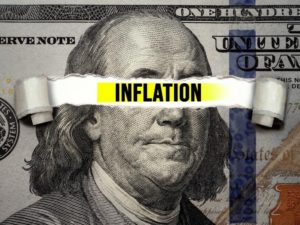Why Experts Say High Inflation Isn’t Going Away Anytime Soon, Even if the Worst Is Behind Us
(8/18/22 - Alex Gailey)

If there’s one word that has caught everyone’s attention in 2022, it’s inflation.
While recent signs suggest the worst may be behind us, inflation is still a major concern for ordinary Americans and the Federal Reserve. And experts say it’ll likely be a couple of years before prices really come down from the highs they’ve seen this year.
July’s inflation data showed that overall prices were flat, while core inflation, excluding food and energy, rose 0.3% — a better report than experts expected, and the slowest rise since March. The most recent jobs report was strong, but this only adds to the complexity. Many economists say low unemployment threatens to keep inflation high, which could mean more rate hikes from the Fed could be coming.
“Even with the likelihood that inflation has peaked, inflation will still remain elevated for some time, as supply chain issues persist and there is still plenty of instability with the Ukraine war, which has caused significant swings in energy prices,” says Zach Stein, chief investment officer at Carbon Collective, an investment advisory firm.
We’ll need more than one month of lower-than-expected inflation numbers before the Fed can slow down on further interest rate hikes, experts say. And all the while, many Americans are concerned a major recession is already well underway after months of high inflation, and rising interest rates.
Economists say it’s too early to tell if we are in a true recession, but the technical definition of a recession is of little concern to Americans who continue to deal with soaring prices. So we asked several experts how long the soaring inflation might last and what people can do to mitigate the impact on their finances.
When Will High Inflation Go Down?
Whether or not the U.S. has passed peak inflation remains a big question with no clear answer among economists.
Prices have begun to decline in some of the most stubborn sectors, such as gas, airfare, and, rental cars, which is a good sign that inflation has peaked. But the truth is no one can really predict what’s ahead. With so many factors at play — such as the Fed’s interest rate hikes, the strength of the dollar, the war in Ukraine — it’s complicated, to say the least.
Why Inflation and High Prices Will Likely Stick Around a While
However, economists and financial experts do agree on one thing: Higher prices will likely last well into next year, if not longer. And that means Americans will continue to feel the pain of higher prices for the foreseeable future.
“It still may take a couple of years, but as we see supply chains finish adapting to these new realities and better balance supply with demand, I expect prices will likewise come down,” Stein says. The reasons we’ve seen such high inflation this past year, he adds, is because of clogged-up supply chains from the COVID-19 lockdowns and the invasion of Ukraine.
Like Stein, Robert Triest, department chair and professor of economics at Northeastern University, expects inflation to decrease over the next two years if the COVID-19 pandemic continues to slow down and the Russian war in Ukraine ends. Action taken by the Federal Reserve, which is targeting a 2% inflation rate by raising interest rates, also makes Triest more optimistic that inflation will come down in the next couple of years.
Preston Caldwell, head of U.S. economics at Morningstar, has a more granular view. He expects prices will stay high for the rest of 2022 but will fall dramatically in the next two to three years.
“While consensus has largely given up on the idea that inflation will be transitory, we still think most of the sources of today’s high inflation will abate (and even unwind in impact) over the next few years,” Caldwell says. “Combining these factors with tightening monetary policy, we expect inflation to undershoot 2% in 2023 and 2024.”






